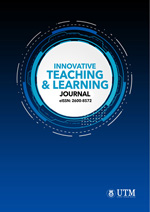The Impact of Project-Based Learning through Integrating the Use of Technology in Computer Science Courses on Students' Acquisition of Programming Skills
DOI:
https://doi.org/10.11113/itlj.v8.152Keywords:
Computer Science, Project-based learning, Programming, Technology, Students' acquisitionAbstract
One of the pedagogical approaches that actively makes use of the 21st century learning strategy is project-based learning (PjBL). Students' problem-solving skills are enhanced and they are better equipped to deal with challenges in the real world thanks to project-based learning. Additionally, it teaches computational thinking to students. This study aims to examine the impact of technology-integrated project-based learning on students' acquisition of programming abilities in computer science courses. The project-based learning approach aims to teach students how to responsibly manage their learning choices. Projectbased learning was carried out in this study using the PBL Gold Standard (2020) model paradigm, which has 7 components. All seven of these elements will be used by the student in their study to help them better understand Python programming techniques. Each element of this strategy represents the learning characteristics of the twenty first century and functioned as a manual for integrating project-based learning in the classroom. Based on the literature analysis, this Gold Standard PBL approach uses seven project-based learning components: significant material, a need to know, a driving question, student voice and choice, 21st century skills, creativity, and reflection. For this research, a one-group pre-test and post-test design with 30 students (n=30) from form 3 was used. The students were selected from a small school in Penang, Malaysia. The outcomes of the post-test were utilized to identify the challenges that students had encountered while studying Python programming code as part of the computer science courses. Before this class, students had limited knowledge of Python programming. After this investigation, the students are pleased and confident in their knowledge of Python programming. The results showed that about 40% of students fared better on the post-test than pretest. It was discovered that the student's understanding in Python programming has significantly increased from the average mean score 57 % to 74.5 % marks. Meanwhile, there were a significant change in the means of the pre- and post-test for the experimental group that indicates the project-based learning approach had a positive effect on students' acquisition of programming skills. Therefore, project-based learning plays as a learning strategy to help students acquire knowledge and solve problems. The project-based learning approach can improve student’s engagement with the material, and active learning during the teaching and learning process when compared to other teaching strategies, such as the conventional teacher-centred learning method. Moreover, the study only focussed in Python programming code topic and did not explore the effectiveness of other programming topic. Only students from one school involved in the research study, thus the results cannot be generalized to other population. In conclusion, it is hoped that this study will assist educators in understanding how to reduce students' misconceptions and understanding about programming code especially Phyton and implemented project-based learning in the classroom to create meaningful learning for the students.

















